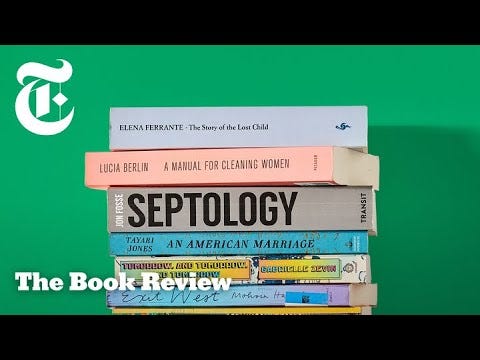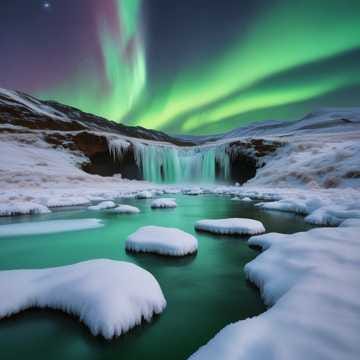100 Best Books of the 21st Century: Readers Respond
plus an interesting Artificial Intelligence Adventure
Recently I featured a select reading list culled from the New York Times Book Review’s 100 Best Books of the 21st Century. Each book on my list offered something a little different from standard narrative fiction; some of those books I found more pleasing and accessible than others, but I applauded them all for a willingness to experiment. Here by the way is the Times podcast promoting the project:
On September 8th, the Times Book Review unveiled a new list, The Readers’ 100 Best Books of the 21st Century. I did a little research to see how the Book Review solicited reader votes, but so far haven’t found an answer. Still, I assume the readers’ list represents a fairly generous sample of reader opinion. As you would imagine, comparing the two lists, one from readers and one from a group of experts in the book world, leads to some enlightening observations.
First of all, I wondered how many of the fourteen novels I identified as experimental from the novels I’d read on the expert list would also appear in the readers’ list. In other words, are readers as adventurous in their taste as the experts? Conversely, how many of the books that appear only on the readers list would be more adventurous in form?
Here’s the six more or less experimental titles from the books I read that are on both the readers’ and the expert list:
#16) Lincoln in the Bardo - George Saunders’
#30) A Visit From the Good Squad - Jennifer Egan
#34) Cloud Atlas - David Mitchell
#53) Trust - Herman Diaz
#64) 2666 - Roberto Bolano
#84) Tenth of December - George Saunders
Here’s the books readers selected, but the Times didn’t, that I’ve read, along with their ranking in the readers poll. Most, but not all, are more traditional in form:
3.) A Gentleman in Moscow - Amor Towles (2016)
11.) A Little Life - Hanya Yanagihara (2015)
27.) Normal People - Sally Rooney (2018)
28.) Cutting For Stone - Abraham Verghese (2009)
32.) Cloud Cuckoo Land - Anthony Doerr (2021)
33.) The Book Thief - Markus Zusak (2005)
34.) The Nickel Boys - Colson Whitehead (2019)
46.) The Song of Achilles - Madeline Miller (2011)
51.) Caste - Isabel Wilkerson (2020)
56.) The Hunger Games - Suzanne Collins (2008)
66.) Just Kids - Patti Smith (2010)
68.) The Devil in the White City - Erik Larson (2003)
72.) Crying in H Mart - Michelle Zauner (2021)
74.) Klara and the Sun - Kazuo Ishiguro (2021)
75.) The Lincoln Highway - Amor Towles (2021)
76.) Just Mercy - Bryan Stevenson (2014)
78.) Kafka on the Shore - Haruki Murakami (2002)
79.) 1Q84 - Haruki Murakami (2009)
82.) Tom Lake - Ann Patchett (2023)
83.) Let the Great World Spin - Colm McCann (2009)
87.) Girl, Woman, Other - Bernardine Evaristo (2019)
96.) The Vanishing Half - Brit Bennett (2020)
97.) My Year of Rest and Relaxation - Ottessa Moshfegh (2018)
Of these twenty-three titles, I’d say that only the two Murakami titles, plus Girl, Woman, Other, a novel in verse, are more experimental in form. and all three of those books appear near the end of the readers’ list. I love all three of them, plus a few of the more traditional titles (A Gentleman in Moscow; A Little Life; Klara and the Sun; Let the Great World Spin) and enjoyed most of the rest, so it’s not like I like only “difficult” fiction. It certainly seems though that readers in general are more conservative in their tastes than the experts.
Other interesting observations:
Thirteen authors appear multiple times on the readers’ list and ten authors on the expert list, but interestingly enough, only one author appears multiple times on both lists: George Saunders. The other nine on the experts list: Ferrante, Jesmyn Ward, Bolano, Alice Munro, Edward P. Jones, Philip Roth, Hilary Mantel, Denis Johnson, Zadie Smith. The other twelve on the readers list: Doerr, Towles, Ishiguro, Whitehead, Wilkerson, Patchett, Miller, Verghese, Murakami, James McBride, Khaled Hosseini, Patrick Radden Keefe.
Readers and experts agree on 39 titles. Within the top 20 reader favorites are sixteen that appear in the expert list (the other four are All the Light We Cannot See; A Gentleman in Moscow; Educated; A Little Life). Within the top 20 expert favorites are fifteen that appear in the readers’ list (the other five are The Known World; Austerlitz; Outline; The Sellout; Erasure). Eight books are in both top 20’s: Pachinko; My Brilliant Friend (#1 on the expert list)'; Never Let Me Go (#9 on both lists!); The Underground Railroad; Wolf Hall; The Road; Lincoln in the Bardo; The Amazing Adventures of Kavalier & Clay.
The bottom thirty-five on the readers list includes only three titles from the experts list (Sing, Unburied, Sing; Tenth of December; The Plot Against America). Most of the others seem to me like they would be very much at home on the expert list.
In general the readers’ list includes a considerable amount more fiction, memoir, and reading for young people than the expert list, which is by and large fiction.
This is a highly subjective opinion, but in my estimation, the only author on either list whom I think of as a producer en masse of best sellers is Stephen King (#54 on the readers’ list with 11/22/63).
Finally, half of the readers’ top 10 is either not on the expert list at all or is in the bottom 40 on the expert list: Demon Copperhead (#1 on the readers’ list); All the Light We Cannot See; A Gentleman in Moscow; Educated; Tomorrow, and Tomorrow, and Tomorrow; Station Eleven.
Post-Script:
You would think that as an English teacher, I would have sampled ChatGTP if only to see how easy it would be for my students to avail themselves of AI to avoid thinking. Yet, I haven’t ever even visited the ChatGTP site, much less supplied it with a prompt. I suppose I don’t really want to know how easy it is to generate essays with AI. Yet, how interesting it is that five minutes after reading about Suno in the Boston Globe recently, I dove right in. Suno is a music composition AI; supply it with some verbiage and it will churn out in seconds two complete songs, each with the same set of lyrics. The Globe article suggested you could use Suno to write a song that would accompany a slide show or video from a vacation. Here, for your listening pleasure, are the two songs that emerged from Suno when I supplied it with the prompt “Iceland, vacation, cold, rain”. I’m kind of a little scared at how catchy they are:
Iceland Vacation - Version #1
Iceland Vacation - Version #2
Let me know what you think in the comments section below:





Some musings on this: I think lists like this are interesting when it comes to modern fiction because it speaks to a time when there are so many books and many more options for leisure and entertainment. Expert lists are curated by a very select group of people.
Speaking as a mother of children ranging from 21 to 9, there is a great fracturing of culture. Children are not really watching the same movies—if watching long form movies at all. Fewer children and young people are reading for fun. Even my own age group is more into sensational memoir than literary fiction— I base this unscientifically off of a wide variety of friends and acquaintances. I think there is a diminished role in expert reviewers, the gatekeepers and tastemakers. I’ve been reading about how these reviews no longer influence sales as they once did. Of course it’s not really about sales in the end for the true artist. It’s about truth, beauty and goodness. A great story will have that. And if art is good enough you need to have faith that it will take off—that’s why I think reader lists are more valuable in assessing cultural relevance and are, due to the social aspect of recommendations, more powerful.